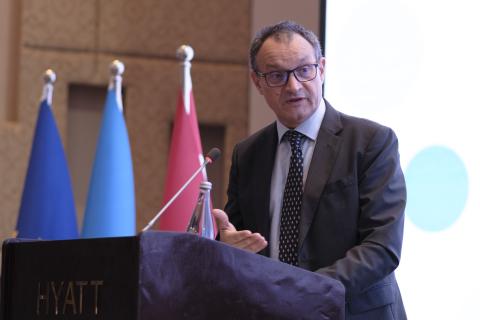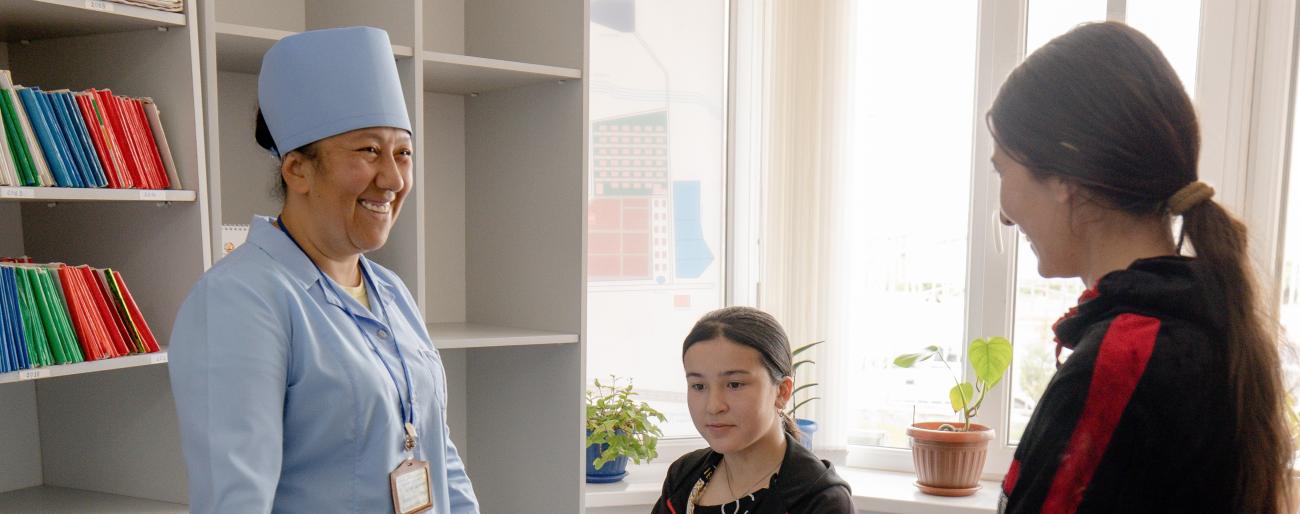Ongoing health financing reforms in Tajikistan are transforming how PHC is funded and delivered. By pooling public resources regionally and shifting to per capita payments, the country is aligning budgets with community needs, expanding access to essential services, and reducing the financial burden on patients.
Districts across Tajikistan have long faced fragmented, inflexible funding that made it difficult to meet population health needs. With greater autonomy and predictable funding, PHC providers can now prioritize services for vulnerable groups and respond to local priorities.
A government-led pilot in five districts of Sughd Oblast is improving provider planning, transparency, and access to essential services. Lessons learned from the pilot will guide a nationwide rollout and benefit package reform.
WHO, through the UHC Partnership and with EU support, has brought Ministries of Health and Finance together, provided technical expertise, built institutional capacity, and helped align public financing reforms with universal health coverage goals.
“We’ve learned a great deal from Türkiye’s experience in health system reform and have seen firsthand how they implement innovative approaches to organizing healthcare services. Their experience inspires us to be more ambitious and reinforces the importance of implementing effective reforms in health financing.”
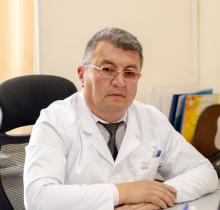
“I am very excited about the health financing pilot. It will make a real difference, not just in how we work, but for the entire community. Our district previously struggled with limited funding and rigid financial rules. Now we have greater autonomy to allocate resources based on local health needs, especially maternal and child health.”
“The technical support from UHC-P and WHO has greatly enhanced our partnership with the Ministry of Health, offering valuable insights into public financial management within the health sector. The joint work on assessments and strategy has reshaped our approach to health financing and improved how we understand and tackle systemic issues.”
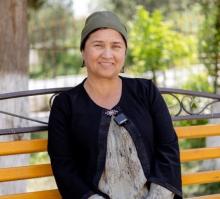
“I heard that some medicines, like the ones I need to manage my diabetes, may become more affordable in the future or even free of charge. This would be amazing news and help my family a lot.”
“We greatly appreciate the support provided by WHO and recognize the vital role of the UHC Partnership and the European Union in making this cooperation possible. Together, we are working to build a healthier future for Tajikistan."
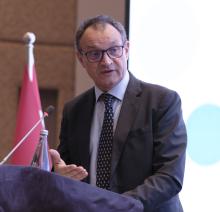
“Through the UHC Partnership, WHO remains committed to supporting Tajikistan in turning its vision for universal health coverage into a reality. Together, we are laying the groundwork for lasting improvements that ensure quality healthcare for all.”
“I am very excited about the health financing pilot. It will make a real difference, not just in how we work, but for the entire community,” says Dr Komiljon, Head of the Primary Health Care facility in Devastich district, Tajikistan.
“Our district previously struggled with limited funding and rigid financial rules. Now we have greater autonomy to allocate resources based on local health needs, especially maternal and child health,” he said.
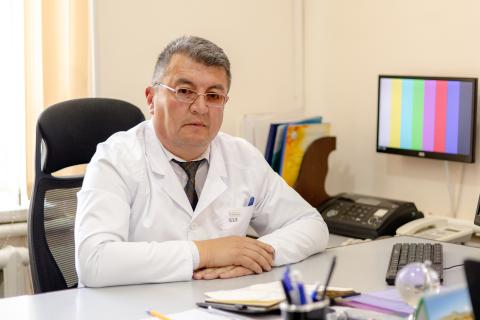
With support from WHO through the UHC Partnership and EU funding, Tajikistan is launching bold health financing reforms to strengthen primary healthcare (PHC), expand access to essential services, and reduce the financial burden on patients. A groundbreaking pilot, launched in January 2025 in five districts of Sughd Oblast, introduces new mechanisms to improve how resources are allocated in PHC facilities.
The pilot brings an important change in places like Devastich, a remote district in Sughd Oblast. By introducing pooled budgeting, new governance structures, and results-oriented financing, it empowers local PHC facilities to meet the real health needs of the communities they serve.
The UHC Partnership operates in over 125 countries, representing over 3 billion people. It is supported and funded by Belgium, Canada, the European Union, France, Germany, Ireland, Luxembourg, Japan, the United Kingdom of Great Britain and Northern Ireland, and WHO.
Part of Tajikistan’s long-term reforms
The pilot is part of broader, nationwide health system reforms that are improving access to essential health services. Over 20 years ago, the Government of Tajikistan adopted a PHC model based on family medicine, invested in PHC infrastructure and systems, and providing training to support its health workforce. For example, the proportion of the national health budget allocated to PHC increased from 34.6% in 2010 to 40.7% in 2022. The share of primary health care facilities operating under the family medicine model rose from 56% in 2010 to 86% in 2023, and the average number of visits to health facilities increased from 4.8 visits per person per year to 7.4 visits per year in the same period. Over the past 10 years, more than 5 000 doctors and 10 000 nurses have received training at their local PHC centre.
These investments in PHC have not only improved the infrastructure and capacity of the healthcare system, but also led to tangible health outcomes including reduced mortality rates and the prevalence of diseases. The maternal mortality rate decreased from 68 per 100 000 live births in 2000 to 16.63 in 2020, and the infant mortality rate decreased from 37 to 26.7 between 2010 and 2022. The prioritization of PHC has also contributed to achieving high immunization coverage rates. Over the past decade, routine immunization coverage has reached at least 95% of the population. WHO declared Tajikistan polio-free in 2002, and malaria-free in 2023.
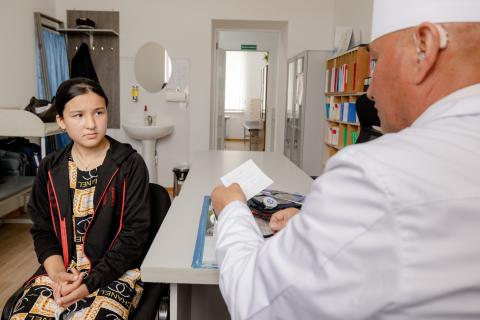
Meeting community needs through PHC
For years, Tajikistan’s healthcare system has relied on outdated, input-based budgets and high out-of-pocket expenses for patients. The ongoing reforms involve a shift to pooling resources and purchasing services strategically. Additionally, healthcare facilities will be funded based on the number of individuals they serve in the community - a model known as capitation-based financing. These changes will make the system more efficient and incentivize healthcare providers to deliver high-quality care.
In Devastich, one of the five pilot districts, these reforms are already reshaping how care is delivered. “Based on my understanding of the needs of the people in Devastich, I’ve started adjusting how we plan and budget. We’re now investing in staff development to strengthen our team and better serve our community,” said Dr Komiljon, who leads the local PHC facility and is seeing the shift firsthand.
Evidence-based decision making
Evidence has been central to Tajikistan’s health system reforms. A range of WHO-supported studies, like the first-ever health labour market analysis in the WHO European Region and a budgetary space assessment, have helped Tajikistan shape policies, allocate resources more fairly, and guide the pilot’s design.
One major breakthrough is the revision of the national health benefit package. WHO, through the UHC Partnership, is helping the Government define which essential outpatient medicines should be covered. This includes common treatments for diabetes, asthma, and hypertension - conditions that burden thousands of households due to the high out-of-pocket costs of the needed medication.
For people like Nizomova, a mother of four in Devastich-Gunchi living with diabetes, the reform couldn’t come soon enough. “I heard that some medicines, like the ones I need to manage my diabetes, may become more affordable in the future or even free of charge. This would be amazing news and help my family a lot” she says.
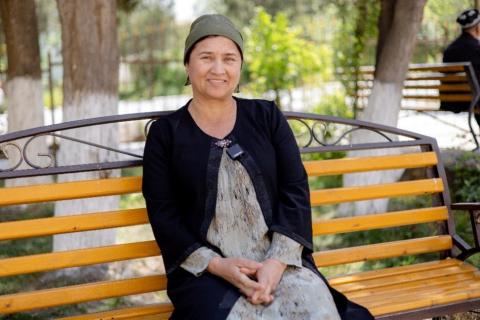
Beyond policy design, WHO has worked closely with national stakeholders to build the skills and systems needed to implement the benefit package. From training Government staff to aligning new coverage with available funding, this behind-the-scenes work is laying the foundation for better financial protection.
A benefit package which includes more essential medicines and health services means families can access the care they need without falling into poverty. This work is a crucial component of the health financing reforms and represents a significant milestone on the path to universal health coverage.
Long-term support for meaningful health system transformation
Transforming health financing is a complex process. With EU support and through the UHC Partnership, WHO has worked for years to help lay the foundation for change. This included establishing an interagency expert group under the Ministries of Finance and Health, setting up a strategic purchasing unit in Sughd Oblast, and securing the adoption of the first-ever Government regulation on PHC contracting. WHO has also conducted extensive capacity-building at both national and regional levels, equipping stakeholders from various sectors with the skills and knowledge needed for implementing reforms.
Collaboration with WHO has also helped Tajikistan build a strong evidence base for action. National leaders now engage directly with the findings of key studies, improving their ability to plan reforms that are grounded in real-time data and systemic realities.
One significant analysis, for example, uncovered the over-hospitalization of patients, many of whom could be treated as outpatients at the primary care level. Addressing this issue will ease pressure on hospitals, lower costs, and reduce risks like hospital-acquired infections, making PHC the first and best point of care.
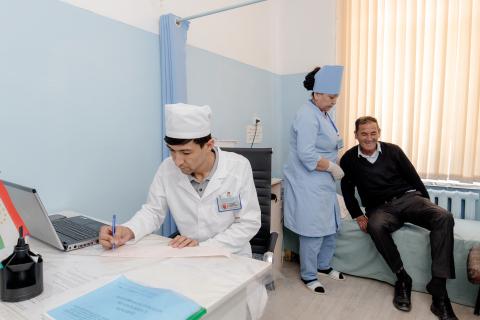
National and international collaboration for UHC
Despite being a relatively small country, Tajikistan has garnered significant international recognition for its efforts to strengthen its health system. Thanks to the platforms and events facilitated by the UHC Partnership, along with support from WHO and the EU, high-level representatives from Tajikistan have had the opportunity to share their progress, exchange ideas, and collaborate with experts and countries worldwide. For example, WHO facilitated strategic collaboration between the Government of Tajikistan and the Republic of Türkiye focusing on healthcare management, financing, and service delivery.
“We’ve learned a great deal from Türkiye’s experience in health system reform and have seen firsthand how they implement innovative approaches to organizing healthcare services. Their experience inspires us to be more ambitious and reinforces the importance of implementing effective reforms in health financing,” said Mr Sarvar Qurboniyon, Deputy Minister of Finance, Tajikistan.
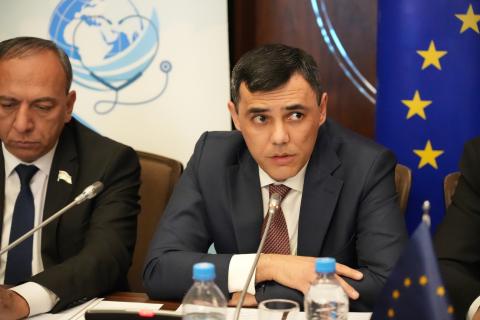
These partnerships are not just symbolic; they shape real decisions. Through this strategic engagement, Tajikistan is strengthening its health system by learning from other countries, broadening its vision, and adopting best practices for sustainable healthcare development.
Cross-sectoral collaboration to advance reforms
WHO’s technical guidance has helped bridge a longstanding gap between the Ministries of Health and Finance. Joint studies, strategic dialogues, and shared evidence have transformed how these ministries work together on health financing.
“The technical support from UHC-P and WHO has greatly enhanced our partnership with the Ministry of Health, offering valuable insights into public financial management within the health sector. The joint work on assessments and strategy has reshaped our approach to health financing and improved how we understand and tackle systemic issues,” said Mr Sarvar Qurboniyon, Deputy Minister of Finance, Tajikistan.
Tajikistan has boosted its budget for the health sector by more than 20 percent in the last five years. In a major step forward, health and care worker salaries have increased by 40% in July 2024, with an additional 20% raise expected in 2025. These efforts directly address one of the biggest barriers to improving performance and retaining skilled professionals.
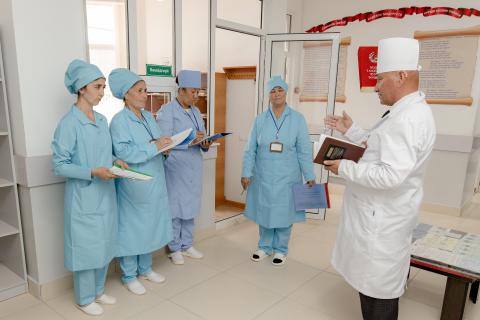
Looking to the future
“We greatly appreciate the support provided by WHO and recognize the vital role of the UHC Partnership and the European Union in making this cooperation possible. Together, we are working to build a healthier future for Tajikistan," said Mr Qurboniyon.
With the impactful support from WHO through the UHC Partnership and EU funding, Tajikistan is making real strides in reforming health financing. The ongoing pilot in Sughd Oblast is already shaping future reforms, and the lessons learned will guide a nationwide scale-up of better governance and smarter financing. Continued investment in stakeholder capacity, strengthened governance structures, and evidence-based decision-making will be critical to sustaining progress. These reforms are helping to make healthcare more affordable, accessible, and equitable for the population.
Dr Victor Olsavszky, WHO Representative to Tajikistan, highlights the road ahead: “Through the UHC Partnership, WHO remains committed to supporting Tajikistan in turning its vision for universal health coverage into a reality. Together, we are laying the groundwork for lasting improvements that ensure quality healthcare for all.”
